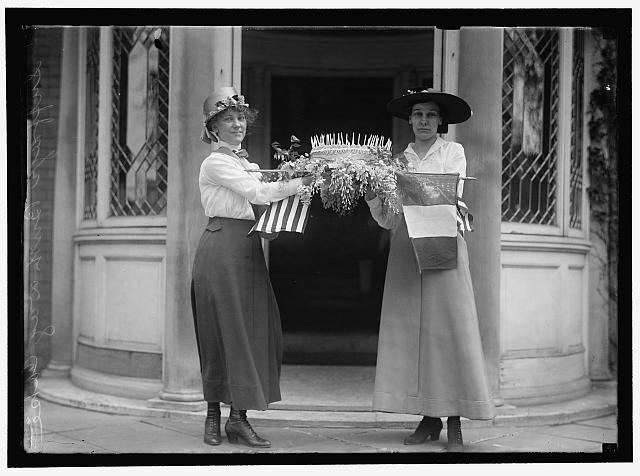Today is Women’s Equality Day
August 26, 2013
By Jennifer Lee – Today is Women’s Equality Day. On Aug. 26, 1920, every woman in the United States got the right to vote with the passage of the 19th Amendment. The fight for the right to vote, known as suffrage, was a fight that lasted three generations.
We are familiar with the names of the women who fought for us; Alice Paul, Carrie Chapman Catt, Susan B. Anthony, Sojourner Truth, Ida B. Wells, Lucy Burns, among many others. They rallied, marched and drew attention to the massive inequality in our democracy: female citizens could not vote.
The suffragists wore white clothing and pushed their small children in strollers in suffrage marches to show they were honorable and feminine. They held signs during protests that simply read “Votes for Women.” Other signs were directed at President Woodrow Wilson, who was not a supporter of having women vote. One famous sign posed a question to Wilson. It read, “Mr. President, How long must women wait for liberty?
The suffragists (mockingly called suffragettes) never stopped fighting for the right to vote until they won. They were humiliated, arrested, choked, brutally beaten, jailed and, when on hunger strikes, force-fed. On Nov. 14, 1917, suffragists were brutalized in prison. It became known as the Night of Terror.
Suffragists risked their lives so women could vote.
Voting, like to the right to free speech is part of the foundation of our democracy. Where would we be without the right to vote? On Aug. 26, 1920 women became a part of our democracy.
Fifty years later on Aug. 26, 1970, a women’s strike was held across the country. This was during the great women’s liberation movement. Betty Friedan, co-founder of the National Organization for Women (NOW) knew she needed some muscle in the women’s liberation movement. She announced that women across the country would strike for their rights. She chose the date of Aug. 26 to connect the women’s liberation movement with the suffrage movement.
Women started organizing for the Strike. Posters adorned with the phrase “Don’t Iron while the Strike is Hot” were printed for distribution.
With the help of many feminists (the women’s liberation movement was a grass roots movement) the strike happened and according to NOW member Jacqui Ceballos many were wondering how many women would show up to march. Like many who organize protests the anxiety of a big turnout is ever present until you see the protest happen.
On Aug. 26, Ceballos, with her sister organizers, nervously approached the Manhattan street to enter the Women’s Strike. With apprehension she rounded the corner and she saw the marchers. She was stunned. There were so many women she said, “You could not see the end. You could not see the end.”
Protesters proudly held handmade signs way up high for the news cameras. Women from every walk of life were there; writers, teachers, flight attendants (called “stewardesses” back then), bookkeepers, and housewives. Many held signs that read “Shakespeare for Women’s Liberation, “WomanPower,” and incisively, “Is God He?”
Strength, pride and humor were evident in the Women’s Strike of 1970. Thousands of onlookers watched in stunned silence as these women, men and their children marched for women’s rights. Supportive husbands pushed their children in strollers beside their wives. Gay women, who were standing up for themselves within the women’s movement, held signs that jokingly mocked the fears of straight women and the sexist news media. One particularly funny sign read, “Lesbianism is a Feminist Plot.”
There were poignant moments during the Women’s Strike. Himilce Novas, a NOW member, remembers a very old woman in her eighties rushing from the sidelines and grabbing her arm. She said to Novas, who was in her early 20s at the time “Do it for my granddaughter. It’s too late for me, but do it for her.” Years later upon relating this story Novas said, “I knew then I was doing the right thing.”
In 1971, Congress designated Aug. 26 as Women’s Equality Day because Congresswoman Bella Abzug requested they do so. Remembering and honoring the work of suffragists and feminists is important. It is now the day we honor the suffrage fight. We thank the suffragists for their sacrifices.
Let’s take this commemorative day one step further. Let’s make it a holiday. In the United States there is not one federal holiday named for women.
Women and girls deserve to have Women’s Equality Day designated a federal holiday.
Happy Women’s Equality Day!
Jennifer Lee is a filmmaker. She speaks publicly about girls and leadership. Her film “Feminist: Stories from Women’s Liberation” is about the feminists of the women’s liberation movement 1963-1970. It is screening at the Veteran Feminists of America 20th Conference and at the upcoming Cincinnati Film Festival She is based in Los Angeles.

